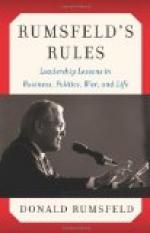A nation can act only through its Government, and, as at this moment the British Nation is united in the resolve to fight this war out, the Government has, without looking back, to give a lead. The first thing is for the Cabinet to convince the public that it is doing all that can be done, and doing it in the right way. But the public does not trust its own judgment. That much-talked-of person the man in the street does not fancy himself a general, and is not over-fond of the military critic—the unfortunate man whose duties have compelled him to try to qualify himself, to form a judgment about war. There is a sound instinct that war is a special business, and that it should be managed according to the judgment of those who are masters of the trade; not those who can write about it, but those who have practised it and proved their capacity. But those men, the generals who are, believed to have a grasp of the way to carry a war through, are all outside the Cabinet. The Cabinet has its chosen expert adviser, the Commander-in-Chief; but rumour or surmise hints that his advice has been by no means uniformly followed. Surely the wisest course which the Cabinet could now adopt would be to call Lord Wolseley to their board as an announcement and a guarantee that in the prosecution of the war his judgment was given its true place, and that nothing thought by him necessary or desirable was being left undone. If the military judgment holds that more force is required the extra force must be provided. There are, after the Regular Army and the Marines, the whole of the Militia, the Volunteers, and thousands of trained men in the British colonies. There is no difficulty, seeing that the Nation is determined to keep on its course, about drawing upon these forces to any extent that may be required. If there are constitutional forms to be fulfilled they can be fulfilled; if Parliamentary sanction is needed it can be had for the asking.
At the present rate of consumption the fifth division will hardly have been landed before its energies will be absorbed, and unless Sir Redvers Buller is peculiarly fortunate during the next few days, the fifth and sixth divisions together will not be enough to change the present adverse situation into one of decided British preponderance. There should be at the Cape a reservoir of forces upon which the British Commander should be able to draw until he can drive the enemy before him. When that stage comes the flow of reinforcements might be suspended, but to stay or delay it before that stage has been reached is to court misfortune.




